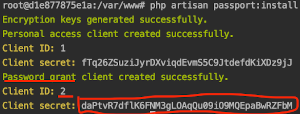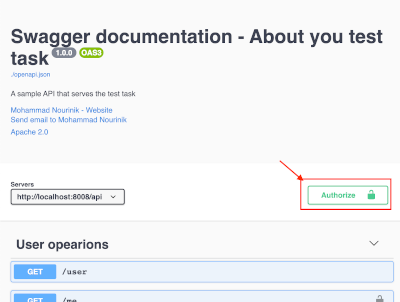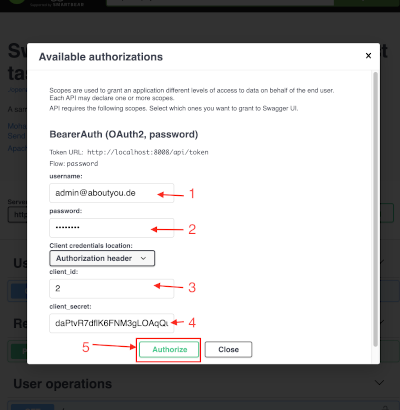A Laravel application for Matrix multiplication. The app features a REST-API with authentication (oauth2/laravel passport).
Since the application is fully dockerized the only thing that needs to be installed on host machine is docker. To have the app up and running please run the following command in the project's root directory:
docker-compose up -dIt might take a while after first run to install dependencies via composer and run migrations. To make sure everything is done properly please run
docker-compose logs -f core(it will be done by running the seeder as a migration).
Note that you need to generate oauth key-pairs and a password grant client to call protected APIs. To do so please read Swagger-ui section.
This app contains three containers:
- Application
corecontainer (application + NginX) database(mysql 8)swagger-uifor api documentation
Core container, contains the entire application, including composer and nginx. The base url to access core
container form the host machine is http://localhost:8008/.
To get access to core container command line, in the project's root directory (the place where the docker-compose.yml
file is located) you may run docker-compose exec core bash. it will open a session to access command line via bash
interpreter into the core container.
We have an instance of mysql 8 as the database container. you may access this database via following credentials from the host machine:
- port:
8306 - root's password:
localhostrootpwd - default schema:
aboutyoutest - username:
mysql - password:
mysql
In order to access swagger ui please open localhost:8009 in a browser.
Since the end points are protected via laravel passport guard, it needs to authenticate via a user with swagger-ui. To do so you may follow the instruction below.
To install laravel passport php artisan passport:install needs to be run,
as you may know (and according to the documentation) it will generate oauth key-pairs as well as 2 clients.
The first client (id: 1) is personal access client, but since we are going to authenticate a sample seeded user via
password grant, we need to copy and keep client secret of the second client (id: 2), which is a password grant client.
To authenticate via swagger-ui, first press Authorize button on the top right of the swagger-ui and fill in the
form with following values:
- username:
admin@aboutyou.de - password:
password - client_id:
2 - client_secret: the token you've copied on step 1
and press Authorize button
Now you may open any API, press on Try it out and send your custom body to get proper response.
In order to run tests, in the core container please run the following command:
vendor/bin/phpunitTests are divided to the following groups:
authentication(everything regarding authentication)basic-rules(test usage of laravel embedded rules)calculate(Test calculations)defaultfailure(All tests with assertion of an exception or a kind of failure)feature(All feature tests)in-memory-database(Tests that require an in-memory database)matrix-rule(Tests related to the implemented matrix rule)multiplicable-rule(Tests related to the implemented multiplicable rule)multiply-service(Test multiply service)repository(All tests related to repositories)rules(All tests over implemented rules)services(Tests related to services)success(Tests that assert normal and success scenarios)to-excel-column-name-converter-service(Test to-excel-column-name-converter service)unit(All unit tests)user(Tests related to user entity)user-service(user service tests)validation(All tests related to validations, rules and requests)
in order to run a group of test you can run tests via following command:
vendor/bin/phpunit --group {group-name}For running code sniffer, in the core container run the following command:
vendor/bin/phpcsPowered by laravel



